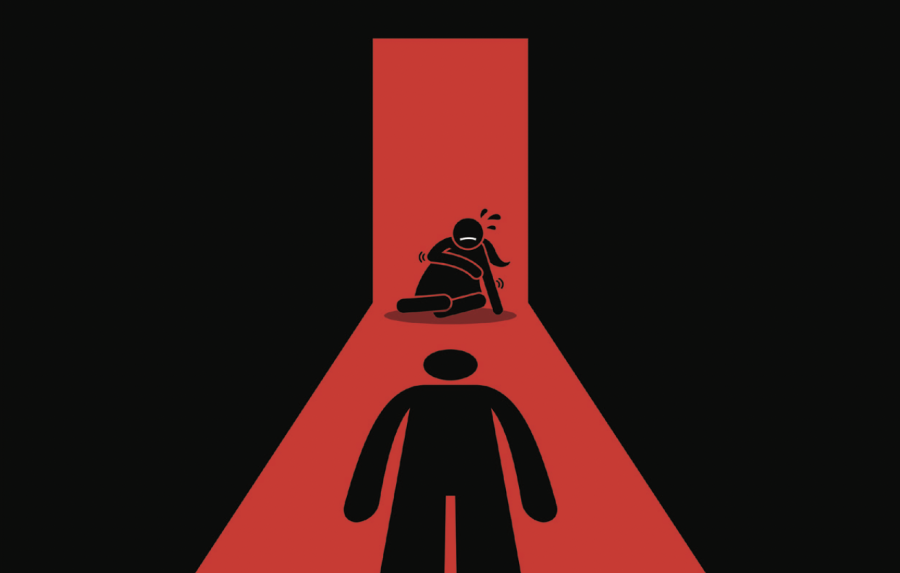National
Rape charge against an actor by a minor exposes rampant culture of grooming
Minors are often unaware of what constitutes grooming and are unable to share their experiences. Many fear stigmatisation and face threats from their abusers.
Aakriti Ghimire
On Sunday, the District Police Office, Tanahun, took Paul Shah, an actor, into custody, in response to a rape case filed by a singer five days ago.
The singer, who is a minor aged 17, has accused Shah, 32, of raping her with a false promise of marriage. She filed the case in Tanahun days after a controversy arose, with various kinds of reports surfacing on various online news outlets. On Sunday itself, yet another case was filed at the Area Police Office, Gaindakot, Nawalparasi by the singer.
Tanahun police confirmed that the accused had been taken into custody. Inspector Laxmi Pandey of the Area Police Office, Gaindakot, said they have received a complaint and that they are investigating.
An actor for the last decade, it is apparent that Shah enjoys significant clout in the industry, with many from the movie fraternity—men and women—jumping to defend him, completely oblivious to the nature of the charge he was facing.
That the accuser is a minor and the accused double her age is a typical example of how sexual predators capture their young victims, according to experts in legal matters and sociology, who say the case highlights grooming of minors that happens in Nepali society but often goes unnoticed or unreported.
Grooming is a process by which a person prepares a child, significant adults, and the environment for the abuse of this child.
“Many minors in Nepal are victims of grooming. Oftentimes what is normalised as love and affection is in fact sexual violation of children,” says Rashtra Bimochan Timalsena, assistant director of the National Law College.
Grooming involves the process of creating a system based on trust among the guardians and friends, thereby gaining access to the child and their compliance. Then, by manipulating the child to avoid disclosure, perpetrators abuse the child sexually for a long time. In the case of Shah, as charged by the minor, he had given a false promise of marriage, so as to ensure that she would not disclose the relationship.
“Underage children are baited by older individuals who tempt them with various things. It begins by gaining access to them and their family. And then, they build a narrative that they are looking after the minor or are guiding them or being their guardians,” says Neeti Aryal Khanal, a lecturer of Sociology at the Tribhuvan University. “So, it isn’t the minor alone who gets groomed but the entire family becomes a victim.”
According to the statistics published by WOREC (Women Rehabilitation Center), the majority of rape cases reported are of minors. About 45 percent of rape cases reported were of girls below 16, and 37 percent were aged 17-25 in the last fiscal year 2020-21.
Experts say individuals who are known to the survivor and their families are involved in a majority of grooming cases. Given their proximity to the children and trust by their guardians, children are most vulnerable from individuals they are familiar with.
Statistics corroborate that in the fiscal year 2020-21, around 56 percent of women were raped by neighbours, 17 percent by their partners and 15 percent were raped by family members.
However, many cases of rape of minors go unreported.
Experts say that there are various factors because of which minors hesitate to share their experiences of abuse. From the lack of awareness of what constitutes child sex abuse to the fear of victim-blaming, minors rarely share, let alone report their experiences to the police.
“Firstly, minors might not be aware that they are being groomed and by the time they realise, decades might have passed. Secondly, they fear being stigmatised by society. In many cases, minors are threatened by their perpetrators, either directly or indirectly, to keep their mouth shut,” says Pinki Singh Rana, a board member at Saathi, a non-governmental organisation that works against gender-based violence and discrimination.
A student, now 22, at the Tribhuvan University said she was just 15 when her partner raped her. He was 10 years older than her, she said. She met him in her school.
“Where there is love, there is sex, he would say consistently. I was just 15,” said the student whom the Post is identifying as Parvati, not her real name, to protect her privacy. “He raped me. I was at no age to give consent and what he did was manipulation and grooming.”
As the debate arose over Shah and the singer’s relationship, some were quick to cover it in the garb of “consensual”, which is extremely problematic, say experts.
“When the victim is below the age of 18, there is no point in debating about consent. Whether they say yes or no doesn’t matter,” says Timalsena, an advocate. “Minors are not eligible to give consent. This becomes a case of statutory rape because the victim is a minor.”
According to the Act Relating to Children, 2075 (2018), minors are persons who have not attained the age of 18 years and are unable to provide any form of consent. Any involvement with a minor regardless of sexual activity such as kissing or touching also constitutes child sex abuse.
According to Section 66, Chapter 8 of the Act, any person that proposes, lures coerces, or threatens a child for sexual activity, or uses, or causes to use, them for the purpose of sexual gratification are deemed to have committed child sex abuse.
In addition, any acts of touching, kissing, holding sensitive parts of the body of the child, embracing them with sexual intent or causing them to touch or hold sensitive parts of the alleged perpetrator’s own body or body of another person or render the child unconscious with sexual intent or display or cause the child to display sexual organs are also considered offences against children.
However, there are no laws specific to grooming in Nepal.
Countries such as the United Kingdom, the United States, Germany, the Netherlands and Australia have laws, particularly regarding the grooming of minors.
The National Penal (Code) Act, 2017 has provisions of six months to three years of jail term and a fine of Rs30,000 for those who mediate to settle a rape case outside the court. Even those inciting mediation and putting pressure for out-of-court settlement for rape cases can face criminal charges.
According to the Act, if the victim of rape is between 14 and 16 years old, the jail term is 12-16 years. If the victim is between 16 and 18 years old, the rapist can get a 10-14 years jail term.
These existing laws, however, have been of no use to many minors who have faced child sex abuse.
The lack of awareness of the existing laws and about what constitutes grooming has gravely affected their access to justice.
“Many minors are unaware of what is a good touch and bad touch. The education system—both in schools and at homes—does not teach children about grooming and how it manifests,” says Rana. “When minors are unaware of what is happening to them, how will they recognise it as something wrong?”
That is exactly what happened to Saraswati (name changed to protect her privacy).
Saraswati was unable to seek any help because she was unaware that she was being manipulated and she feared stigmatisation. She was 14 when she began receiving notes from her teacher who was in his 30s. The teacher taught in her school and he was married with children.
“He would pass on notes during the assembly that read ‘I like you’ and ‘I admire you’, and in one instance, he even gave me a letter written with blood,” she said.
Saraswati hid those letters she received from her teacher, unable to share them—or complain—with anyone else.
“His actions led me to believe that’s how love is and that is how we should trust people and I believed everything he said,” says Saraswati, now 21, who is currently a student and a blogger.
“I blamed myself for a really long time for all that I faced. It is now, as I speak with you, I realise how I got manipulated.”
According to Rana, who runs shelter homes for women and children, many individuals normalise the behaviours of their abusers and recognise their abuse years later.
Experts say while society cautions children against strangers, they fail to warn their children against their family members.
“Research shows that many individuals who groom minors are often found in their close proximity, including within family members,” says Khanal.
Many behaviours that are considered an expression of affection—hugging, kissing, cuddling—with children are often of sexual intent, even when performed by family members, according to Khanal. “It’s a misuse of trust placed by parents and children,” she says.
Such misuse of trust on many occasions happens from close family members.
Mithila (named changed) was manipulated into giving sexual favours when she was 16.
“I used to call him dai—an elder brother—and he would always act like two different individuals,” shares Mithila. “He would pretend to be an elder brother in the presence of people but when we were alone, he would be extremely physically affectionate. He persuaded me often to meet him alone or would propose going to desolate areas and that always creeped me out.”
Mithila says the abuser would open his shirt buttons, sit with her, and caress her all the while claiming to be her elder brother.
When she tried explaining her situation to their mutual friends, no one believed her. They dismissed her experiences of abuse. “How can you say such things about dai? That was everyone’s reaction,” she adds.
What complicates the situation is on most occasions, victims do not find anyone to share their experience with. And even if they manage to find someone to talk to, they are blamed.
While Saraswati blamed herself for her abuse, Parvati and Mithila were blamed, dismissed by their family and friends.
“Our society is enmeshed in rape culture, and striking evidence of that is victim-blaming. In the recent case of Paul Shah, individuals have started picking on the victim’s appearances, TikTok videos, and so on to assassinate her character and are blaming her for entrapping the actor instead,” says Khanal.
Radhika Khatiwada, a lawyer who has taken up the minor’s case against Shah, said the case will now proceed further based on the actor’s statement.
“The court will now take up the case. There’s a certain legal procedure and that will be followed,” says Khatiwada. “The complainant is a child and the law states that a child’s consent is invalid. Even if the child said yes, it still doesn’t become consensual.”
Timalsena, the advocate and assistant director of the National Law College, says it’s time Nepal came up with some clear laws to protect children and minors from falling prey to sexual predators.
“Nepal should work to introduce laws on grooming,” says Timalsena. “Many countries have done it, and if we are to protect our children, we should too.”
Shuvam Dhungana contributed reporting.




 9.7°C Kathmandu
9.7°C Kathmandu














